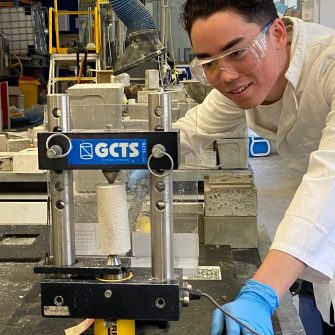
Thomas Brown
“Whether you desire to work at a mine, an investment bank, tunnelling, or consulting, the UNSW mining engineering program ensures that you will be ready for that role when you graduate, no matter what it is.”
1. What attracted you to study Mining Engineering?
One of the most appealing things about studying mining has to do with its significance to the Australian economy. Being the second largest contributor to Australian GDP, it was exciting to know that the industry I work in plays a key role in shaping Australia.
Currently mining is undergoing a momentous change socially and technologically, implementing many new innovations, such as artificial intelligence, renewable energy, and digital transformation. With the rapid pace of advancements in the industry, I was excited by the potential to leave a positive mark in the mining industry as it transitions to a more sustainable future.
2. What would you say to current high school students looking to study Engineering at UNSW?
Make sure you look into alternative entries to the UNSW engineering programs such as the Faculty
of Engineering Admissions Scheme (FEAS). Do not forget to apply for as many scholarships as possible and do not miss the deadline for them. Most importantly if UNSW is your goal, make sure you never lose sight of it.
3. How do you think your studies at UNSW will help in your career aspirations?
The mining engineering program at UNSW is truly relevant to the current mining industry and equips you with the skills required to work in any graduate position. Whether you desire to work at a mine, an investment bank, tunnelling, or consulting, the UNSW mining engineering program ensures you will be ready for that role when you graduate, no matter what that role is.
4. Can you share something about the mining industry that might interest someone considering studies and a career in this industry?
Mining is extremely important to the Australian economy as it is the second largest contributor to the Australian GDP. This makes mining such a vital role to the Australian economy. Studying mining does not mean you can only work as a mining engineer. There are plenty of opportunities only available to graduates of mining engineering to work for investment bank, private capital, risk management, or in other finance roles.
5. What was your pathway into UNSW?
After completing my HSC, I attended the University of Wollongong for one year in their engineering program. After my first year I decided to transfer to UNSW which was a straightforward process.
6. Is there anything else that you would like to share about the benefits of your UNSW experience?
The mining engineering cohort at UNSW is quite small, which is great as students develop a strong relationship with each other, and with the academic staff. All the lecturers know everyone’s name and faces and are extremely supportive throughout your progression of the degree. The small class size and strong rapport, really adds to the learning environment making is fun and more casual.
The mining school at UNSW has a super strong connection with industry and peak bodies such as AusIMM. This strong connection allows students to interact with industry partners right from the beginning of their study at UNSW. This allows students to easily gain summer vacation work and graduate positions.
7. Anything else you would like to add?
The employment rate is an aspect which should be considered when choosing a university degree. Mining has one of the strongest employment rates out of any degree in UNSW, with 100% of students attaining a graduate position prior to completing their studies.
